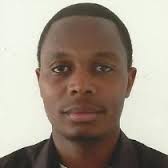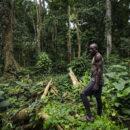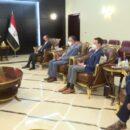Why IGAD’ s new South Sudan peace proposal is problematic – By Brian Adeba

 The newly unveiled IGAD proposal to resolve South Sudan’s crisis has not been warmly received – both the rebels and the government appear to have rejected all or parts of it. It is worth examining the proposal carefully, because what IGAD is suggesting is problematic.
The newly unveiled IGAD proposal to resolve South Sudan’s crisis has not been warmly received – both the rebels and the government appear to have rejected all or parts of it. It is worth examining the proposal carefully, because what IGAD is suggesting is problematic.
IGAD’s suggested roadmap includes three crucial elements: power sharing, inclusivity, and a transitional government. But beneath these elements lie a host of potentially contentious issues that may derail peace if not addressed properly. There is also the glaring omission of the Arusha Agreement and its potential to contribute to a holistic peace in the upcoming negotiations.
As is usual under these circumstances, the power-sharing arrangement focuses a lot on governmental positions. At the national level, the proposal spells out that the Government of South Sudan would hold 53 percent of ministerial positions. The SPLM-in-Opposition (SPLM-IO) would get 33 percent of the ministerial portfolios, and the former political detainees (henceforth referred to as SPLM-FD) including other political parties will be allocated 14 percent of the ministries.
The problem with this power-sharing arrangement is that IGAD has allocated itself the role of defining who or what constitutes a political party in South Sudan. For starters, IGAD seems to misread the exact role of the ten members of SPLM-FD and fails to contextualize their origin.
Basically, these former political detainees are a splinter group of the SPLM. To assign them the role of a political party is disingenuous. The right forum to identify their role would have been the under the auspices of the Arusha Agreement (which IGAD has abandoned.)
Through this proposal, IGAD also fails to understand the role of the so-called political parties of South Sudan under the opposition banner. In addition to lacking platforms, most of these parties lack leadership and constituencies. In Juba parlance, they are known as “briefcase” parties, meaning individuals have created them for self-aggrandizing purposes.
Some, like Martin Elia Lomoro’s South Sudan Democratic Forum, are allied to the government and display no semblance of independence. Lomoro, who currently serves as minister of cabinet affairs, is an apologist of the government and its policies.
Most contentious, if not ridiculous, is IGAD’s proposal that the incumbent president, deputized by a first vice president and a vice president, head the transitional government. It boggles the mind to see the very people who caused this conflict taking a lead in running affairs. This is a potential recipe for disaster. Ideally, this scenario could have been resolved with a neutral transitional government managed by technocrats.
By realigning the power dispensation in what it calls the “states most affected by conflict” (Upper Nile, Jongolei and Unity), by dissolving these states’ legislatures, IGAD has fallen into the trap of regionalizing the South Sudanese conflict by not recognizing the national character of the grievances that caused the war in the first place, as well as ignoring the presence of the SPLM-IO in the Greater Equatoria and Greater Bahr El Ghazel regions.
In this stance, IGAD proposes giving the SPLM-IO 53 percent of ministerial positions in Upper Nile, Jongolei and Unity; the government, 33 percent; SPLM-FD 7 percent; and other political parties 7 percent.
Apart from the problematic issue of curving out a niche for the SPLM-IO in these three states and potentially compromising South Sudan’s territorial integrity, IGAD trashes democracy by ignoring the fact that Lam Akol’s SPLM-DC holds nearly 17 percent of seats in the Upper Nile state legislature. Through this proposal, the SPLM-DC will be lumped together with the so-called opposition parties that have no constituencies in Upper Nile. This is a rape of the people’s right of choice in Upper Nile.
Furthermore, this proposal, through disenfranchising the SPLM-DC constituency, will exacerbate communal tensions in Upper Nile that pit the Chollo (Shilluk), the Dinka and the Nuer against each other. As the recent fighting in Malakal illustrates, Upper Nile is still a powder keg as differences between the Chollo and the Padang Dinka have escalated. What the state needs now is a proposal that will calm and reduce tensions, not one that will incite violence through the disenfranchisement of the Chollo vote in the SPLM-DC.
IGAD also proposes demilitarizing the national capital Juba “in order to create conducive conditions” for setting up the transitional government. It proposes that third party bodies such as the UN, the African Union or IGAD will oversee security. Whether this means that the army will be removed from Juba, while the police, wildlife forces and the prison service will be left intact in the city, is still unclear.
However, at this juncture, it is important to note that the police, wildlife forces and the prison service all have roots in the army, the SPLA. They are therefore bedeviled by the same factors that dog the army – ethnicity, politicization and high-handedness. IGAD’s proposal seems to be unaware of this debacle.
Brian Adeba is an Associate with the Security Sector Governance Group in Canada.







Hi Brian,
The IGAD ROADMAP is troublesome
Mary
We must give peace a chance regardless what are the outcome of IGAD proposal the only sure winner in South Sudan conflict is Omar Al Basheer President of Sudan. Remember newly divorced man will do everything to sabotage the life his former wife.
The IGAD proposal does not seem to address the issue of security. It takes for granted that a transitional government will be able to provide security. This is very problematic. Security can be provided only by an outside blue helmet force operating under Chapter VII of the UN Charter.
SPLM-DC has members in the national assembly as well besides good number of supporters across all other states. I agree with you that this IGAD proposal needs modifications.
IGAD has screwed up peace negotiations for South Sudan. The country is burning up, innocent civilians are either being displaced, raped or killed. Yet to any observer there is no sense of urgency in the IGAD negotiating team. What we see is the usual bureaucratic foot dragging from countries which are wracked by ethnic rivalries and dictatorial leaderships with vested interests in South Sudan.
Is it not time for the UN, AU and world powers to take over peace negotiation process? Is it not time to think of forming a transitional authority without Kiir, Machar and those “briefcase” politicians to lead the country to a free and fair democratic elections supervised by the UN? The people of South Sudan have never known peace probably since the birth of Jesus Christ and the rest of the world is now sitting by, watching a slow motion movie of IGAD treating South Sudan like some former slave territory. This is unacceptable, South Sudanese have a right to ask for another arbiter who has the capacity and real interest in stopping the carnage in South Sudan.
As it is now, the rest of the world is sitting pretty as South Sudan wallows in a genocide…..this is not acceptable!